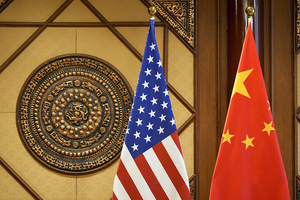U.S. Adds More Chinese Firms to Blacklist Over Balloon Incident, Quantum Tech
Listen to the full version

What’s new: The U.S. Commerce Department added 37 Chinese entities to a trade restriction list Thursday, including eight companies that it said were involved in the balloon incident last year.
The eight Chinese firms were added to the so-called “Entity List” by the Bureau of Industry and Security (BIS) due to their support of China’s High Altitude Balloon that flew over the U.S. in February 2023, posing national security concerns, according to a statement by the bureau. Another three were added for their “connections to companies that support” the balloon program, it said.

Unlock exclusive discounts with a Caixin group subscription — ideal for teams and organizations.
Subscribe to both Caixin Global and The Wall Street Journal — for the price of one.
- DIGEST HUB
- The U.S. Commerce Department added 37 Chinese entities to a trade restriction list, citing involvement of eight companies in a high-altitude balloon incident over the U.S. in February 2023, which raised national security concerns.
- The unmanned Chinese airship was shot down by the U.S. military off South Carolina's coast; China claimed it was used for meteorological research and called the action an overreaction.
- This addition brings the total number of Chinese entities on the U.S. entity list under the Biden administration to 355, surpassing previous administrations, as part of efforts to limit China's access to advanced U.S. technology.
The U.S. Commerce Department recently escalated its trade restrictions against China by adding 37 Chinese entities to its Entity List, citing various national security concerns and issues related to technological advancements [para. 1][para. 2][para. 4]. Among these entities, eight companies were specifically targeted due to their involvement with a high-altitude balloon incident in February 2023, where a Chinese balloon flew over the U.S., raising significant security alarms. The Bureau of Industry and Security (BIS) stated that these firms supported China's balloon program, which included three additional companies connected to this initiative [para. 1][para. 2].
This particular unmanned airship was intercepted and shot down by the U.S. military off the coast of South Carolina, an action that China criticized as an overreaction, claiming the balloon was primarily used for meteorological research [para. 3]. In addition to concerns about the balloon program, another 22 Chinese entities were added to the list for attempting to acquire or successfully obtaining American technology aimed at enhancing China’s capabilities in quantum technology, which has potential military applications [para. 4].
China responded strongly against these U.S. actions. A Foreign Ministry spokesperson condemned what they described as the U.S.'s misuse of export controls and entity lists as tools to target Chinese companies unfairly [para. 5]. This move is part of a broader trend under the Biden administration, which has now added a total of 355 Chinese entities to the list—a record number surpassing even that of the Trump administration, which added 306 entities [para. 6].
Despite these increasing restrictions, efforts have been made by both nations to stabilize their relations. High-level visits from U.S. officials such as Secretary of State Antony Blinken and Treasury Chief Janet Yellen to China indicate ongoing attempts at diplomatic engagement amidst escalating tensions over technology and security issues [para. 7]. These developments underscore a complex relationship between two global powers navigating economic competition and national security imperatives in an increasingly interconnected yet divided world landscape [para. 7].
- MOST POPULAR






